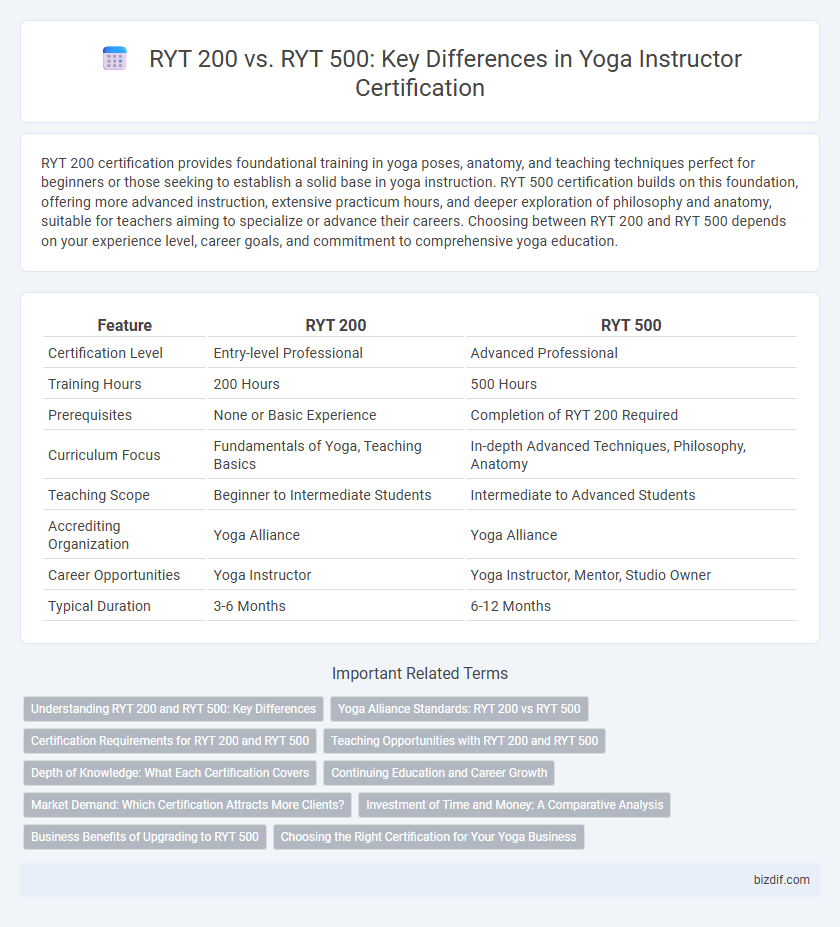RYT 200 certification provides foundational training in yoga poses, anatomy, and teaching techniques perfect for beginners or those seeking to establish a solid base in yoga instruction. RYT 500 certification builds on this foundation, offering more advanced instruction, extensive practicum hours, and deeper exploration of philosophy and anatomy, suitable for teachers aiming to specialize or advance their careers. Choosing between RYT 200 and RYT 500 depends on your experience level, career goals, and commitment to comprehensive yoga education.
Table of Comparison
| Feature | RYT 200 | RYT 500 |
|---|---|---|
| Certification Level | Entry-level Professional | Advanced Professional |
| Training Hours | 200 Hours | 500 Hours |
| Prerequisites | None or Basic Experience | Completion of RYT 200 Required |
| Curriculum Focus | Fundamentals of Yoga, Teaching Basics | In-depth Advanced Techniques, Philosophy, Anatomy |
| Teaching Scope | Beginner to Intermediate Students | Intermediate to Advanced Students |
| Accrediting Organization | Yoga Alliance | Yoga Alliance |
| Career Opportunities | Yoga Instructor | Yoga Instructor, Mentor, Studio Owner |
| Typical Duration | 3-6 Months | 6-12 Months |
Understanding RYT 200 and RYT 500: Key Differences
RYT 200 certification signifies foundational training with 200 hours focused on yoga philosophy, anatomy, and teaching techniques, suitable for beginners and instructors establishing core skills. RYT 500 requires 500 hours of advanced study, deepening expertise in specialized styles, alignment, advanced teaching methodologies, and professional development. Key differences include the depth of curriculum, teaching hours required, and eligibility for advanced teaching roles or workshops within Yoga Alliance standards.
Yoga Alliance Standards: RYT 200 vs RYT 500
Yoga Alliance standards distinguish RYT 200 and RYT 500 certifications by training hours and depth of study, with RYT 200 requiring 200 hours of foundational yoga teacher education and RYT 500 demanding an additional 300 hours for advanced techniques and teaching skills. RYT 200 certification emphasizes basic anatomy, yoga philosophy, and teaching methodology, while RYT 500 builds on this foundation with specialized knowledge in sequencing, advanced anatomy, and mentorship. These standards ensure that RYT 500 teachers possess a higher level of expertise and are qualified to train new teachers, reflecting a progression in professional development within the Yoga Alliance framework.
Certification Requirements for RYT 200 and RYT 500
RYT 200 certification requires a minimum of 200 hours of yoga teacher training covering foundational techniques, anatomy, philosophy, and teaching methodology. RYT 500 certification demands an additional 300 hours beyond the RYT 200, emphasizing advanced practices, specialized techniques, and in-depth study of yoga philosophy and ethics. Both certifications are awarded by Yoga Alliance and require documented training hours for eligibility.
Teaching Opportunities with RYT 200 and RYT 500
RYT 200 certification qualifies instructors to teach beginner and intermediate yoga classes at studios, gyms, and community centers, opening foundational teaching opportunities. RYT 500 certification, which requires advanced training beyond RYT 200, grants eligibility to lead more specialized workshops, mentor other teachers, and secure higher-level teaching roles in prestigious yoga studios and wellness retreats. Many employers prefer RYT 500-certified instructors for leadership positions and continuing education programs, enhancing career advancement in the yoga teaching profession.
Depth of Knowledge: What Each Certification Covers
RYT 200 certification provides foundational yoga training, covering basic anatomy, alignment, teaching methodology, and beginner-level sequencing across essential yoga styles. RYT 500 certification expands on this foundation by incorporating advanced anatomy, philosophy, specialized teaching techniques, and in-depth practice sequencing, often including therapeutic and stylistic variations. The RYT 500 program demands more hours and experience, resulting in a comprehensive understanding suited for teaching diverse student needs and complex classes.
Continuing Education and Career Growth
RYT 500 certification builds on the foundational 200-hour training by offering advanced techniques, deeper understanding of anatomy, and expanded teaching methodologies, which enhances career opportunities and professional credibility. Continuing education through RYT 500 involves more specialized workshops and mentorship, fostering skill refinement and the ability to address diverse student needs. Pursuing RYT 500 certification demonstrates commitment to professional growth, often leading to higher pay rates and eligibility for teaching at advanced studios or specialized yoga programs.
Market Demand: Which Certification Attracts More Clients?
RYT 500 certification attracts more clients due to its advanced training and comprehensive curriculum, making instructors highly sought after in competitive yoga markets. Employers and studios often prefer RYT 500-certified teachers for their deeper knowledge and experience, leading to increased job opportunities and client trust. While RYT 200 is sufficient for entry-level teaching, the RYT 500 designation boosts market demand and professional credibility significantly.
Investment of Time and Money: A Comparative Analysis
RYT 200 certification typically requires around 200 hours of training and an investment ranging from $2,000 to $3,500, making it accessible for most aspiring yoga instructors. In contrast, RYT 500 certification demands approximately 500 hours, often including 300 additional hours beyond the RYT 200, with costs soaring between $4,000 and $7,000 due to advanced coursework and comprehensive training modules. The higher financial and time commitments for RYT 500 reflect its deeper focus on specialized techniques, philosophy, and teaching methodology, catering to professionals seeking advanced credentials and expanded career opportunities.
Business Benefits of Upgrading to RYT 500
Upgrading from RYT 200 to RYT 500 certification enhances credibility, attracting higher-paying clients and premium studio opportunities. The advanced training deepens expertise in yoga philosophy, anatomy, and teaching methodology, allowing instructors to offer specialized workshops and private sessions that boost revenue. Greater professional recognition and expanded teaching scope increase marketability within the competitive yoga industry.
Choosing the Right Certification for Your Yoga Business
RYT 200 certification provides foundational yoga teaching skills ideal for new instructors or small class settings, while RYT 500 offers advanced training suitable for expanding a professional yoga business and attracting diverse clientele. Selecting between RYT 200 and RYT 500 impacts your marketability, teaching depth, and potential partnerships with studios or wellness centers. Prioritize your career goals and target audience when choosing the right yoga certification to ensure sustainable business growth and credibility.
RYT 200 vs RYT 500 certification Infographic

 bizdif.com
bizdif.com